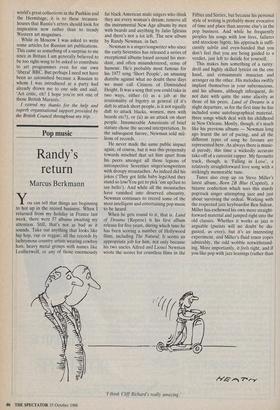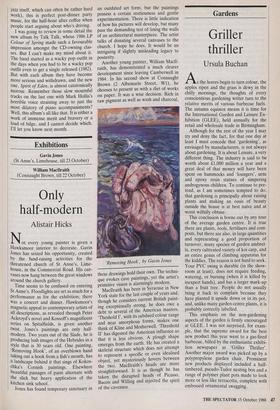Pop music
Randy's return
Marcus Berkmann You can tell that things are beginning to hot up in the record business. When I returned from my holiday in France last week, there were 57 albums awaiting my attention. Still, that's not as bad as it sounds. Take out anything that looks like hip hOp, rap or reggae; all the records by lachrymose country artists wearing cowboy hats, heavy metal groups with names like Leatherwolf, or any of those enormously
fat black American male singers who think they are every woman's dream; remove all the instrumental New Age albums by men with beards and anything by Julio Iglesias and there's not a lot left. The new album by Randy Newman, in fact.
Newman is a singer/songwriter who since the early Seventies has released a series of exceptional albums based around his mor- dant, and often misunderstood, sense of humour. He's probably most famous for his 1977 song 'Short Pebple', an amusing diatribe against what no doubt these days we must call Citizens of Diminished Height. It was a song that you could take in two ways, either (i) as a jab at the irrationality of bigotry in general (if it's daft to attack short people, is it not equally daft to attack blacks, women, men with beards etc?), or (ii) as an attack on short people. Innumerable Americans of brief stature chose the second interpretation. In the subsequent furore, Newman sold mil- lions of records.
He never made the same public impact again, of course, but it was this propensity towards mischief that set him apart from his peers amongst all those legions of introspective Seventies singer/songwriters with droopy moustaches. As indeed did his jokes (`They got little baby legs/And they stand so low/You got to pick 'em up/Just to say hello'). And while all the moustaches have vanished into deserved obscurity, Newman continues to record some of the most intelligent and entertaining pop music to be heard.
When he gets round to it, that is. Land of Dreams (Reprise) is his first album release for five years, during which time he has been scoring a number of Hollywood films, including The Natural. It seems an appropriate job for him, not only because his two uncles Alfred and Lionel Newman wrote the scores for countless films in the
Fifties and Sixties, but because his personal style of writing is probably more evocative of time and place than anyone else's in the pop business. And while he frequently peoples his songs with low lives, failures and atrocious bigots, his approach is suffi- ciently subtle and even-handed that you don't feel that you are being guided to a verdict, just left to decide for yourself.
This makes him something of a rarity: droll and highly skilled lyricist on the one hand, and consummate musician and arranger on the other. His melodies swiftly implant themselves in your subconscious, and his albums, although infrequent, do not date with quite the same alacrity as those of his peers. Land of Dreams is a slight departure, as for the first time he has included some autobiographical material, three songs which deal with his childhood in New Orleans. Mostly, though, it's much like his previous albums — Newman long ago learnt the art of pacing, and all the different types of song he favours are represented here. As always there is music- al parody, this time a wickedly accurate take-off of a careerist rapper. My favourite track, though, is 'Falling in Love', a relatively straightforward love song with a strikingly memorable tune.
Tunes also crop up on Steve Miller's latest album, Born 2B Blue (Capitol), a bizarre confection which sees this sturdy pop/rock singer attempting jazz and just about surviving the ordeal. Working with the respected jazz keyboardist Ben Sidran, Miller has eschewed his own more straight- forward material and jumped right into the old classics. Whether it works as jazz is arguable (purists will no doubt be dis- gusted, as ever), but it's an interesting experiment, and Miller's fluid tenor copes admirably, the odd wobble notwithstand- ing. More importantly, it feels right, and if you like pop with jazz leanings (rather than 'I think Cliff Richard's really amazing.' jazz itself, which can often be rather hard work), this is perfect post-dinner party music, for the half-hour after coffee when people start arguing about who's driving.
I was going to review in some detail the new album by Talk Talk, whose 1986 LP Colour of Spring made such a favourable Impression amongst the CD-owning clas- ses. But I can't make my mind about it. The band started as a wacky pop outfit in the days when you had to be a wacky pop outfit even to get a single released (1982). But with each album they have become more serious and withdrawn, and the new one, Spirit of Eden, is almost catatonically morose. Remember those slow mournful tracks on the last one with Mark Hollis's horrible voice straining away to just the most dilatory of piano accompaniments? Well, this album's all like that. It is either a work of immense merit and bravery or a load of bilge, and I cannot decide which. I'll let you know next month.



























































 Previous page
Previous page